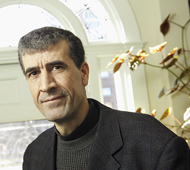Post-Intifada, an Interfaith Hope
SED student: higher education can help Mideast peace

When Ali Jabareen, a Palestinian Arab doctoral candidate at Boston University’s School of Education, traveled to Israel eight years ago to write his dissertation, he never imagined the devastation he would soon witness. In September 2000, a wave of violence between Palestinian Arabs and Israelis ignited the al-Aqsa Intifada, a five-year-long conflict that would claim the lives of more than 5,000 Arabs and Israelis.
Sickened by the carnage, Jabareen (SED’07) set aside his dissertation and focused instead on attempting to bring peace to his war-ravaged homeland. He joined the staff of Al-Qasemi College, the only Islamic institute of higher learning in Israel. Established in 1989 by members of the Israeli Sufi movement, the college changed its focus after the conflict and attempted to build a learning community that promotes peace, cooperation, and understanding among the various Arab and Jewish communities. Jabareen signed on as a lecturer, fundraiser, and director of the English Center.
“The administration hoped to help students become more tolerant of others by challenging the old paradigms within the Arab community,” Jabareen says. “One way we did this was by inviting rabbis and priests to teach. It was our hope that this academic clash of ideas would substitute for other types of clashes in the streets.”
Operating at a grassroots level, the college managed to kick-start a dialogue among scholars of Muslim, Jewish, and Christian faiths. “In 2000, Al-Qasemi had no Jewish lecturers,” Jabareen says. “Today it has 20, and those professors are among the strongest supporters of the college’s vision.”
Al-Qasemi is an advocate of equal education rights, and college officials encourage women to enroll, a move that challenges what Jabareen describes as “the patriarchal traditions of Arab society.” Today, women make up nearly 90 percent of the student population, in addition to serving as lecturers and department heads.
Having helped Al-Qasemi College flourish — the school now has approximately 1,600 students and 160 professors — Jabareen decided last fall to reenroll in SED, and will graduate in May. And while he is working to finish his dissertation —about the educational disparities between Arab and Jewish youths — Jabareen did not leave his passion for tolerance and diversity in Israel. He is now working closely with Charles Glenn, SED dean ad interim, to plan a conference that will bring together officials from faith-based day schools throughout New England. The conference, called Taking Faith Seriously in Schools, will be held at Boston University on April 17 and will feature panel discussions by area school administrators and American and Dutch education experts.
“The purpose of the conference,” says Jabareen, “is to view faith-based schools from various angles in terms of policy and choice and to examine the way in which graduates of these schools are faring in society and the roles these schools play in promoting better citizenship and understanding.”
Parents from four faiths — Catholic, Protestant, Muslim, and Jewish — will explain why they choose to send their children to religiously affiliated schools, and audience members will have the opportunity to ask graduates how they think faith-based schools prepare students for life outside the classroom.
“I think this conference will break new ground, and it would have never come about if it hadn’t been for Ali,” Glenn says. “He was essential in establishing the initial trust between BU and the various schools.”
Vicky Waltz can be reached at vwaltz@bu.edu.